Intercultural Competence in Business
VerifiedAdded on 2023/01/12
|9
|2450
|73
AI Summary
This report explores the significance of intercultural competence in business and its impact on communication and work effectiveness. It includes cultural autobiographies of two individuals with different cultural backgrounds and analyzes different cultural frameworks to evaluate cultural differences. The report concludes that intercultural competence is crucial for professional and academic success.
Contribute Materials
Your contribution can guide someone’s learning journey. Share your
documents today.
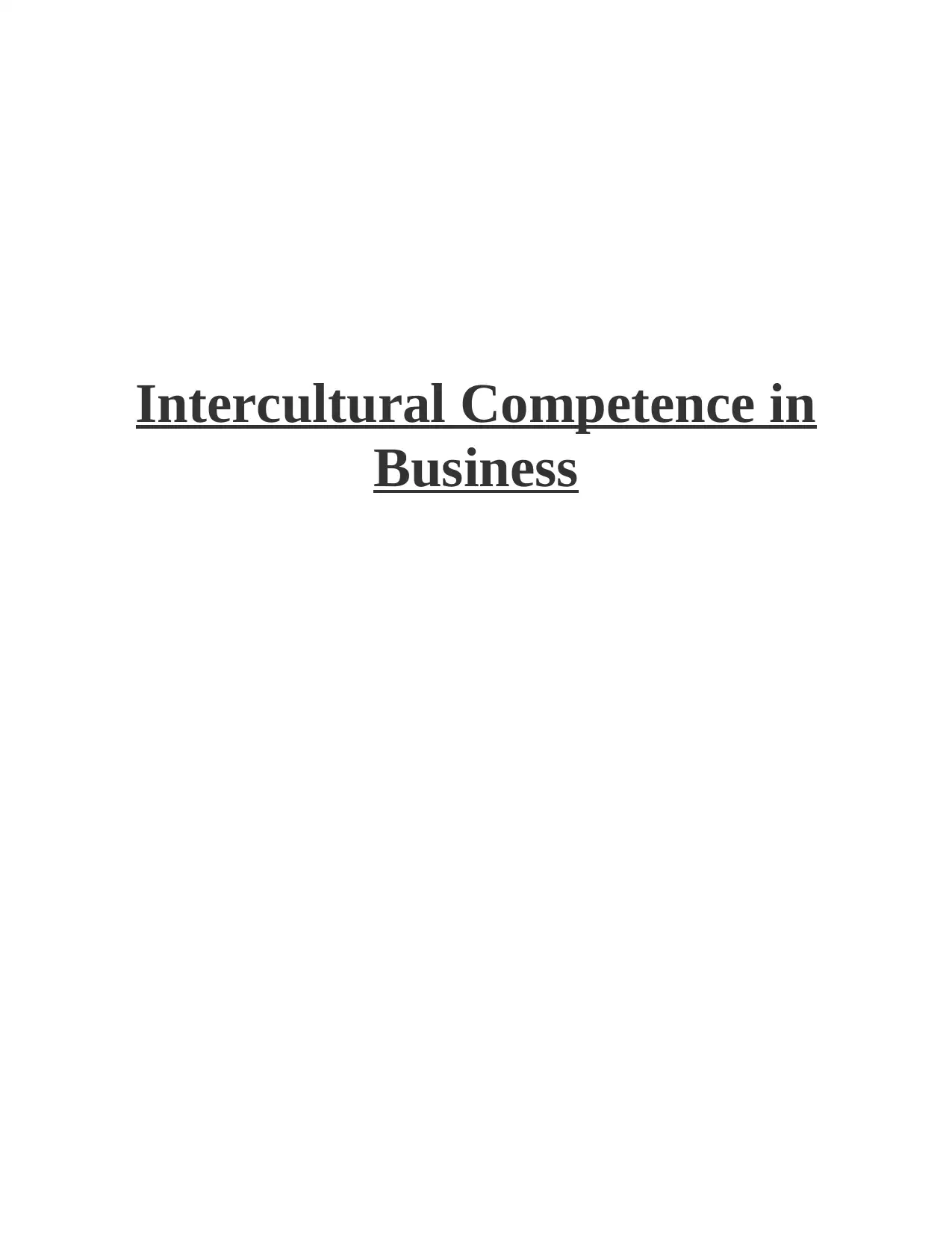
Intercultural Competence in
Business
Business
Secure Best Marks with AI Grader
Need help grading? Try our AI Grader for instant feedback on your assignments.
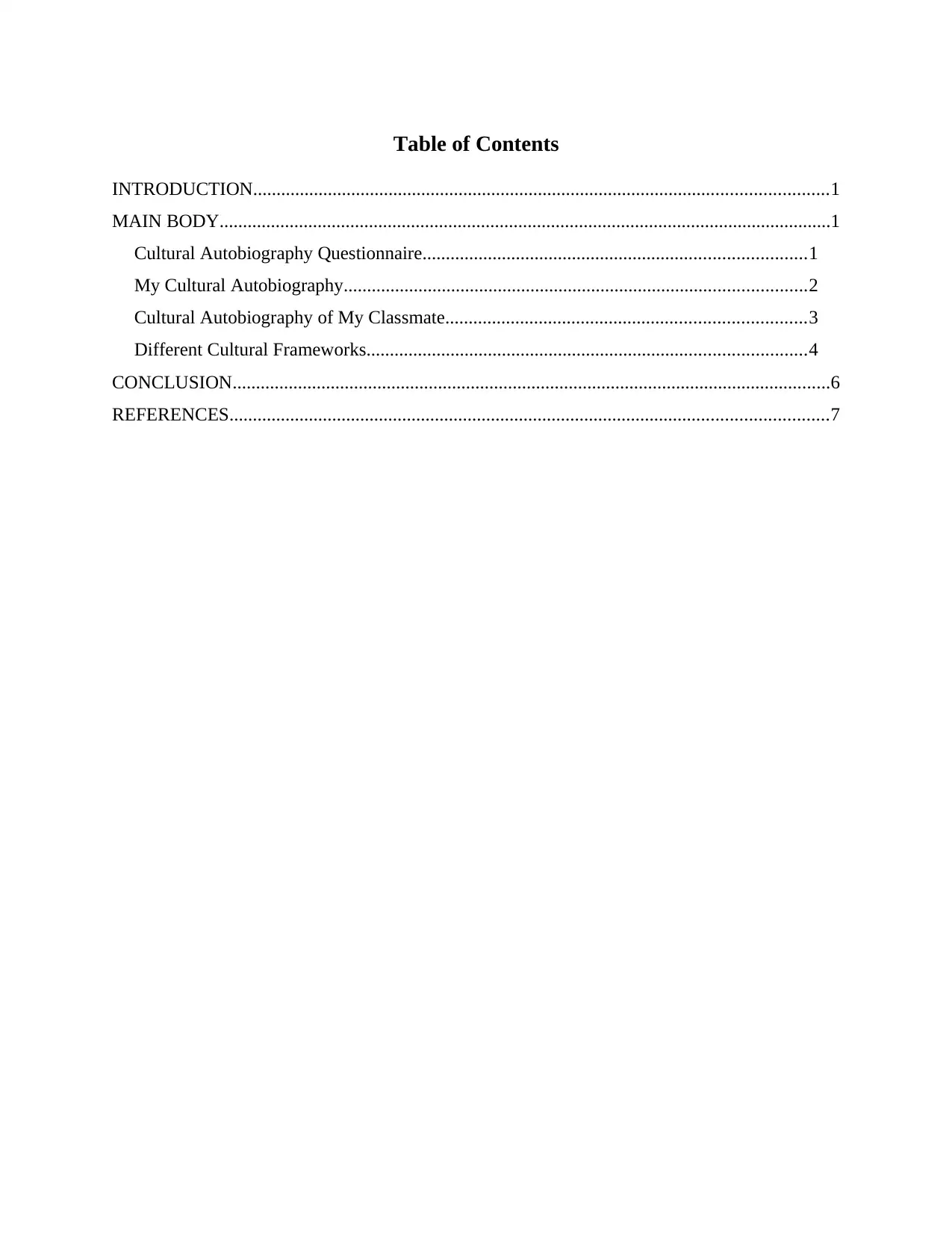
Table of Contents
INTRODUCTION...........................................................................................................................1
MAIN BODY...................................................................................................................................1
Cultural Autobiography Questionnaire..................................................................................1
My Cultural Autobiography...................................................................................................2
Cultural Autobiography of My Classmate.............................................................................3
Different Cultural Frameworks..............................................................................................4
CONCLUSION................................................................................................................................6
REFERENCES................................................................................................................................7
INTRODUCTION...........................................................................................................................1
MAIN BODY...................................................................................................................................1
Cultural Autobiography Questionnaire..................................................................................1
My Cultural Autobiography...................................................................................................2
Cultural Autobiography of My Classmate.............................................................................3
Different Cultural Frameworks..............................................................................................4
CONCLUSION................................................................................................................................6
REFERENCES................................................................................................................................7
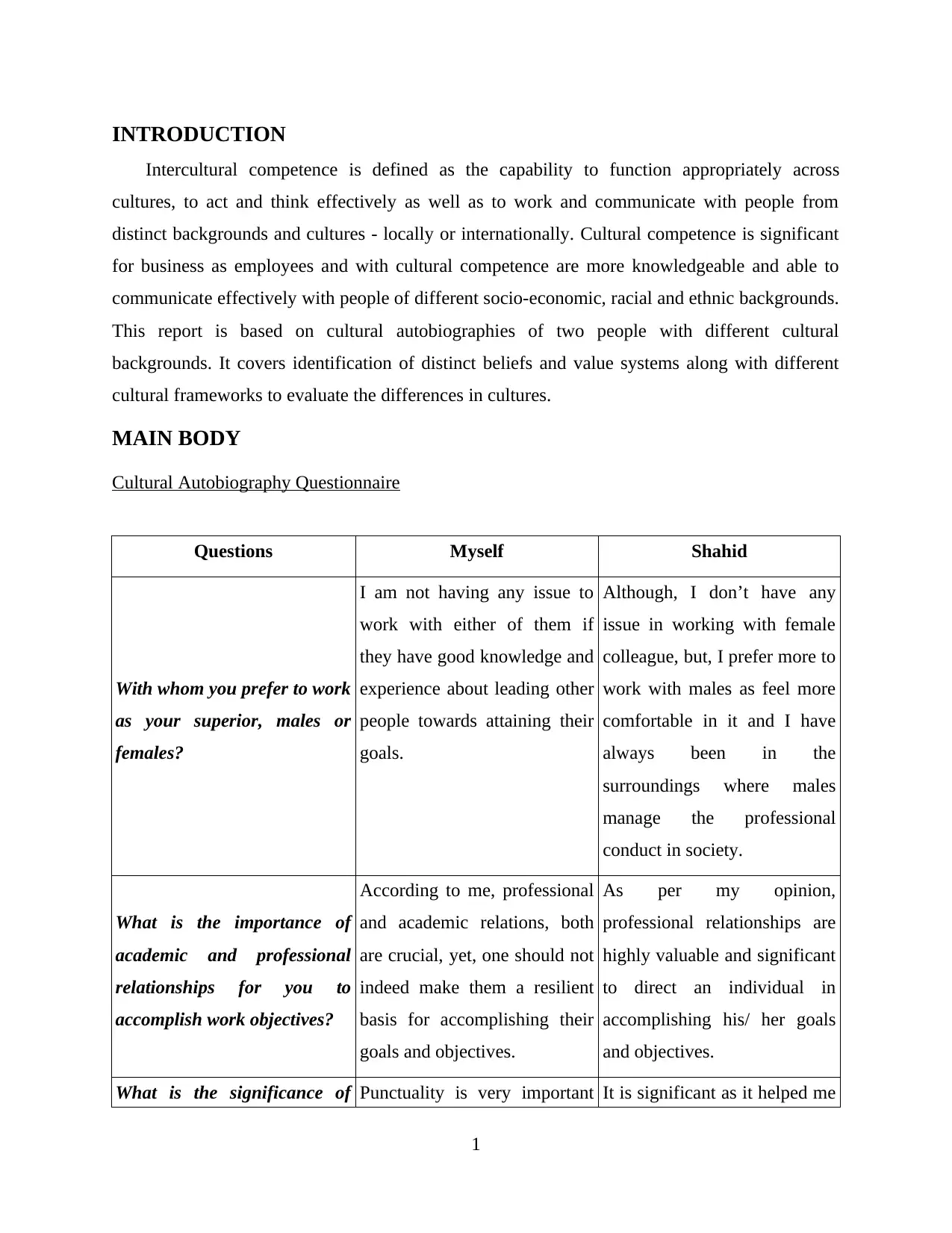
INTRODUCTION
Intercultural competence is defined as the capability to function appropriately across
cultures, to act and think effectively as well as to work and communicate with people from
distinct backgrounds and cultures - locally or internationally. Cultural competence is significant
for business as employees and with cultural competence are more knowledgeable and able to
communicate effectively with people of different socio-economic, racial and ethnic backgrounds.
This report is based on cultural autobiographies of two people with different cultural
backgrounds. It covers identification of distinct beliefs and value systems along with different
cultural frameworks to evaluate the differences in cultures.
MAIN BODY
Cultural Autobiography Questionnaire
Questions Myself Shahid
With whom you prefer to work
as your superior, males or
females?
I am not having any issue to
work with either of them if
they have good knowledge and
experience about leading other
people towards attaining their
goals.
Although, I don’t have any
issue in working with female
colleague, but, I prefer more to
work with males as feel more
comfortable in it and I have
always been in the
surroundings where males
manage the professional
conduct in society.
What is the importance of
academic and professional
relationships for you to
accomplish work objectives?
According to me, professional
and academic relations, both
are crucial, yet, one should not
indeed make them a resilient
basis for accomplishing their
goals and objectives.
As per my opinion,
professional relationships are
highly valuable and significant
to direct an individual in
accomplishing his/ her goals
and objectives.
What is the significance of Punctuality is very important It is significant as it helped me
1
Intercultural competence is defined as the capability to function appropriately across
cultures, to act and think effectively as well as to work and communicate with people from
distinct backgrounds and cultures - locally or internationally. Cultural competence is significant
for business as employees and with cultural competence are more knowledgeable and able to
communicate effectively with people of different socio-economic, racial and ethnic backgrounds.
This report is based on cultural autobiographies of two people with different cultural
backgrounds. It covers identification of distinct beliefs and value systems along with different
cultural frameworks to evaluate the differences in cultures.
MAIN BODY
Cultural Autobiography Questionnaire
Questions Myself Shahid
With whom you prefer to work
as your superior, males or
females?
I am not having any issue to
work with either of them if
they have good knowledge and
experience about leading other
people towards attaining their
goals.
Although, I don’t have any
issue in working with female
colleague, but, I prefer more to
work with males as feel more
comfortable in it and I have
always been in the
surroundings where males
manage the professional
conduct in society.
What is the importance of
academic and professional
relationships for you to
accomplish work objectives?
According to me, professional
and academic relations, both
are crucial, yet, one should not
indeed make them a resilient
basis for accomplishing their
goals and objectives.
As per my opinion,
professional relationships are
highly valuable and significant
to direct an individual in
accomplishing his/ her goals
and objectives.
What is the significance of Punctuality is very important It is significant as it helped me
1
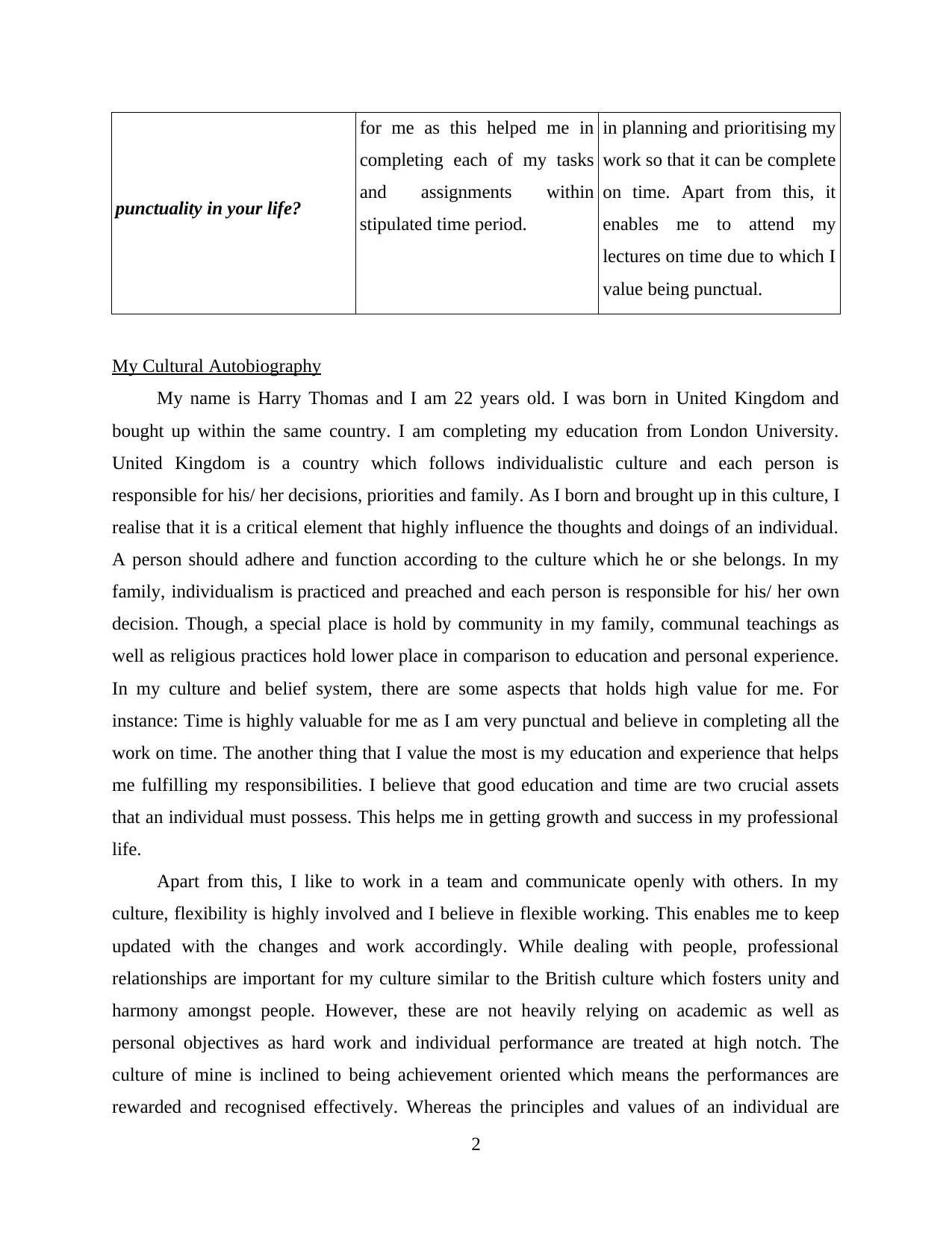
punctuality in your life?
for me as this helped me in
completing each of my tasks
and assignments within
stipulated time period.
in planning and prioritising my
work so that it can be complete
on time. Apart from this, it
enables me to attend my
lectures on time due to which I
value being punctual.
My Cultural Autobiography
My name is Harry Thomas and I am 22 years old. I was born in United Kingdom and
bought up within the same country. I am completing my education from London University.
United Kingdom is a country which follows individualistic culture and each person is
responsible for his/ her decisions, priorities and family. As I born and brought up in this culture, I
realise that it is a critical element that highly influence the thoughts and doings of an individual.
A person should adhere and function according to the culture which he or she belongs. In my
family, individualism is practiced and preached and each person is responsible for his/ her own
decision. Though, a special place is hold by community in my family, communal teachings as
well as religious practices hold lower place in comparison to education and personal experience.
In my culture and belief system, there are some aspects that holds high value for me. For
instance: Time is highly valuable for me as I am very punctual and believe in completing all the
work on time. The another thing that I value the most is my education and experience that helps
me fulfilling my responsibilities. I believe that good education and time are two crucial assets
that an individual must possess. This helps me in getting growth and success in my professional
life.
Apart from this, I like to work in a team and communicate openly with others. In my
culture, flexibility is highly involved and I believe in flexible working. This enables me to keep
updated with the changes and work accordingly. While dealing with people, professional
relationships are important for my culture similar to the British culture which fosters unity and
harmony amongst people. However, these are not heavily relying on academic as well as
personal objectives as hard work and individual performance are treated at high notch. The
culture of mine is inclined to being achievement oriented which means the performances are
rewarded and recognised effectively. Whereas the principles and values of an individual are
2
for me as this helped me in
completing each of my tasks
and assignments within
stipulated time period.
in planning and prioritising my
work so that it can be complete
on time. Apart from this, it
enables me to attend my
lectures on time due to which I
value being punctual.
My Cultural Autobiography
My name is Harry Thomas and I am 22 years old. I was born in United Kingdom and
bought up within the same country. I am completing my education from London University.
United Kingdom is a country which follows individualistic culture and each person is
responsible for his/ her decisions, priorities and family. As I born and brought up in this culture, I
realise that it is a critical element that highly influence the thoughts and doings of an individual.
A person should adhere and function according to the culture which he or she belongs. In my
family, individualism is practiced and preached and each person is responsible for his/ her own
decision. Though, a special place is hold by community in my family, communal teachings as
well as religious practices hold lower place in comparison to education and personal experience.
In my culture and belief system, there are some aspects that holds high value for me. For
instance: Time is highly valuable for me as I am very punctual and believe in completing all the
work on time. The another thing that I value the most is my education and experience that helps
me fulfilling my responsibilities. I believe that good education and time are two crucial assets
that an individual must possess. This helps me in getting growth and success in my professional
life.
Apart from this, I like to work in a team and communicate openly with others. In my
culture, flexibility is highly involved and I believe in flexible working. This enables me to keep
updated with the changes and work accordingly. While dealing with people, professional
relationships are important for my culture similar to the British culture which fosters unity and
harmony amongst people. However, these are not heavily relying on academic as well as
personal objectives as hard work and individual performance are treated at high notch. The
culture of mine is inclined to being achievement oriented which means the performances are
rewarded and recognised effectively. Whereas the principles and values of an individual are
2
Secure Best Marks with AI Grader
Need help grading? Try our AI Grader for instant feedback on your assignments.
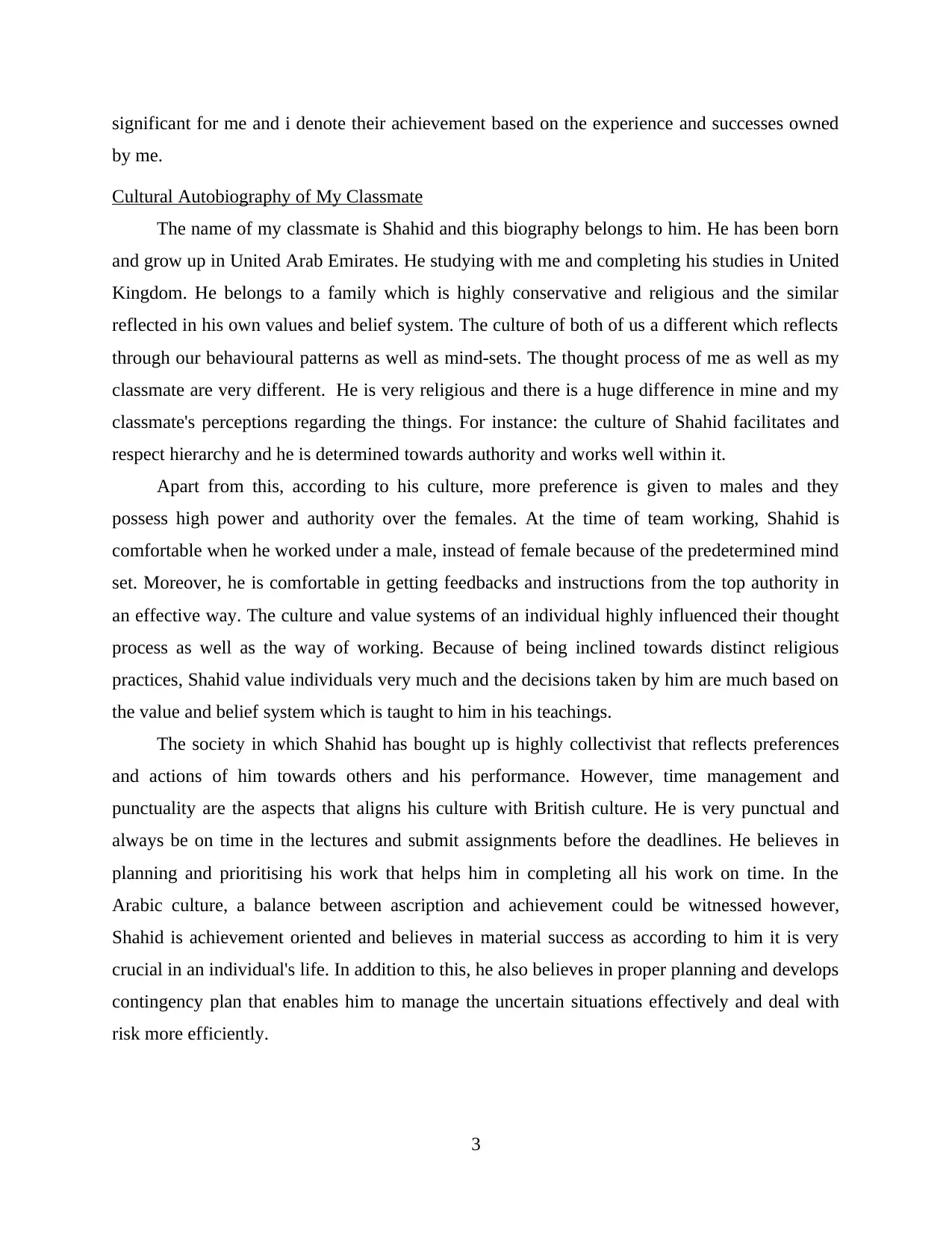
significant for me and i denote their achievement based on the experience and successes owned
by me.
Cultural Autobiography of My Classmate
The name of my classmate is Shahid and this biography belongs to him. He has been born
and grow up in United Arab Emirates. He studying with me and completing his studies in United
Kingdom. He belongs to a family which is highly conservative and religious and the similar
reflected in his own values and belief system. The culture of both of us a different which reflects
through our behavioural patterns as well as mind-sets. The thought process of me as well as my
classmate are very different. He is very religious and there is a huge difference in mine and my
classmate's perceptions regarding the things. For instance: the culture of Shahid facilitates and
respect hierarchy and he is determined towards authority and works well within it.
Apart from this, according to his culture, more preference is given to males and they
possess high power and authority over the females. At the time of team working, Shahid is
comfortable when he worked under a male, instead of female because of the predetermined mind
set. Moreover, he is comfortable in getting feedbacks and instructions from the top authority in
an effective way. The culture and value systems of an individual highly influenced their thought
process as well as the way of working. Because of being inclined towards distinct religious
practices, Shahid value individuals very much and the decisions taken by him are much based on
the value and belief system which is taught to him in his teachings.
The society in which Shahid has bought up is highly collectivist that reflects preferences
and actions of him towards others and his performance. However, time management and
punctuality are the aspects that aligns his culture with British culture. He is very punctual and
always be on time in the lectures and submit assignments before the deadlines. He believes in
planning and prioritising his work that helps him in completing all his work on time. In the
Arabic culture, a balance between ascription and achievement could be witnessed however,
Shahid is achievement oriented and believes in material success as according to him it is very
crucial in an individual's life. In addition to this, he also believes in proper planning and develops
contingency plan that enables him to manage the uncertain situations effectively and deal with
risk more efficiently.
3
by me.
Cultural Autobiography of My Classmate
The name of my classmate is Shahid and this biography belongs to him. He has been born
and grow up in United Arab Emirates. He studying with me and completing his studies in United
Kingdom. He belongs to a family which is highly conservative and religious and the similar
reflected in his own values and belief system. The culture of both of us a different which reflects
through our behavioural patterns as well as mind-sets. The thought process of me as well as my
classmate are very different. He is very religious and there is a huge difference in mine and my
classmate's perceptions regarding the things. For instance: the culture of Shahid facilitates and
respect hierarchy and he is determined towards authority and works well within it.
Apart from this, according to his culture, more preference is given to males and they
possess high power and authority over the females. At the time of team working, Shahid is
comfortable when he worked under a male, instead of female because of the predetermined mind
set. Moreover, he is comfortable in getting feedbacks and instructions from the top authority in
an effective way. The culture and value systems of an individual highly influenced their thought
process as well as the way of working. Because of being inclined towards distinct religious
practices, Shahid value individuals very much and the decisions taken by him are much based on
the value and belief system which is taught to him in his teachings.
The society in which Shahid has bought up is highly collectivist that reflects preferences
and actions of him towards others and his performance. However, time management and
punctuality are the aspects that aligns his culture with British culture. He is very punctual and
always be on time in the lectures and submit assignments before the deadlines. He believes in
planning and prioritising his work that helps him in completing all his work on time. In the
Arabic culture, a balance between ascription and achievement could be witnessed however,
Shahid is achievement oriented and believes in material success as according to him it is very
crucial in an individual's life. In addition to this, he also believes in proper planning and develops
contingency plan that enables him to manage the uncertain situations effectively and deal with
risk more efficiently.
3
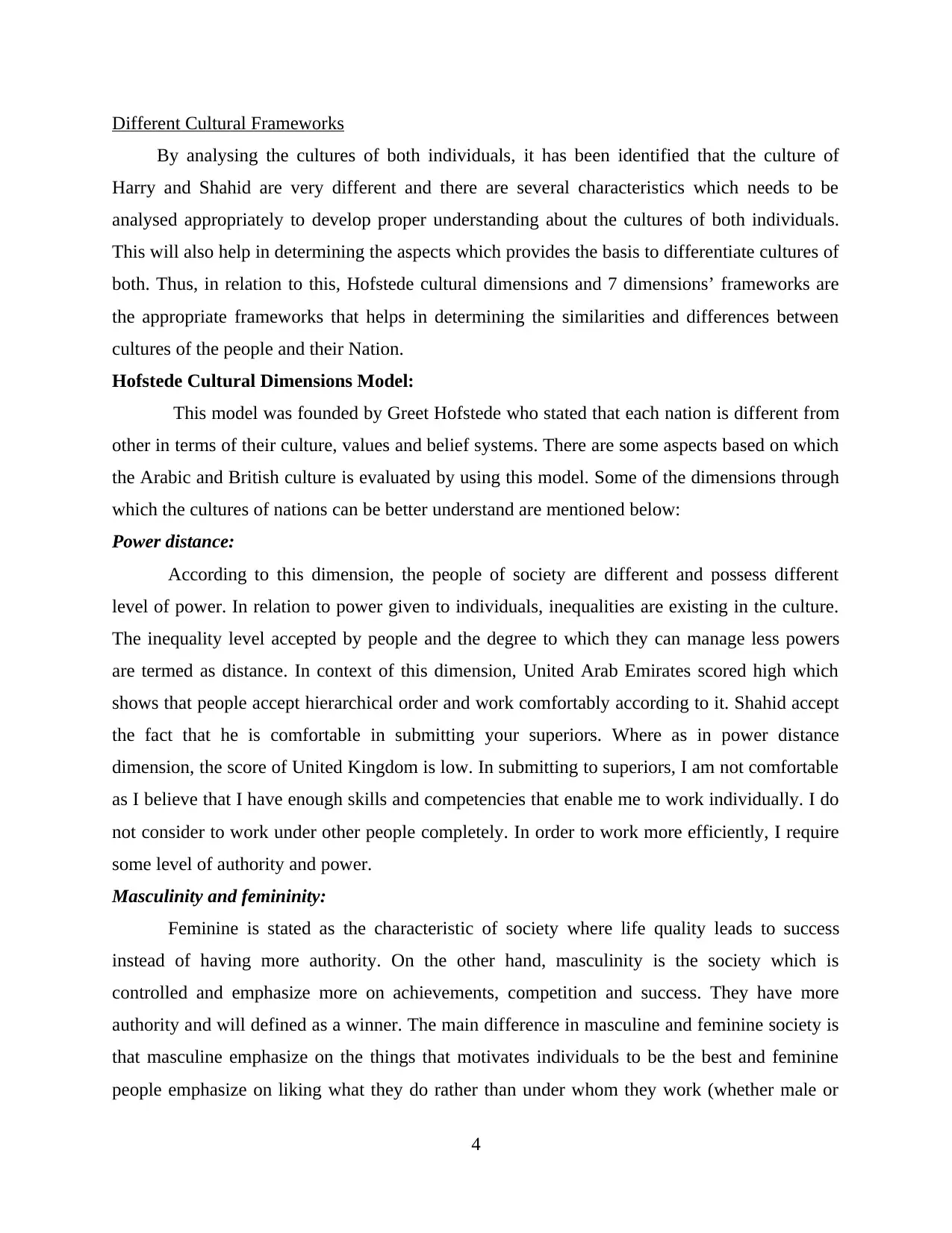
Different Cultural Frameworks
By analysing the cultures of both individuals, it has been identified that the culture of
Harry and Shahid are very different and there are several characteristics which needs to be
analysed appropriately to develop proper understanding about the cultures of both individuals.
This will also help in determining the aspects which provides the basis to differentiate cultures of
both. Thus, in relation to this, Hofstede cultural dimensions and 7 dimensions’ frameworks are
the appropriate frameworks that helps in determining the similarities and differences between
cultures of the people and their Nation.
Hofstede Cultural Dimensions Model:
This model was founded by Greet Hofstede who stated that each nation is different from
other in terms of their culture, values and belief systems. There are some aspects based on which
the Arabic and British culture is evaluated by using this model. Some of the dimensions through
which the cultures of nations can be better understand are mentioned below:
Power distance:
According to this dimension, the people of society are different and possess different
level of power. In relation to power given to individuals, inequalities are existing in the culture.
The inequality level accepted by people and the degree to which they can manage less powers
are termed as distance. In context of this dimension, United Arab Emirates scored high which
shows that people accept hierarchical order and work comfortably according to it. Shahid accept
the fact that he is comfortable in submitting your superiors. Where as in power distance
dimension, the score of United Kingdom is low. In submitting to superiors, I am not comfortable
as I believe that I have enough skills and competencies that enable me to work individually. I do
not consider to work under other people completely. In order to work more efficiently, I require
some level of authority and power.
Masculinity and femininity:
Feminine is stated as the characteristic of society where life quality leads to success
instead of having more authority. On the other hand, masculinity is the society which is
controlled and emphasize more on achievements, competition and success. They have more
authority and will defined as a winner. The main difference in masculine and feminine society is
that masculine emphasize on the things that motivates individuals to be the best and feminine
people emphasize on liking what they do rather than under whom they work (whether male or
4
By analysing the cultures of both individuals, it has been identified that the culture of
Harry and Shahid are very different and there are several characteristics which needs to be
analysed appropriately to develop proper understanding about the cultures of both individuals.
This will also help in determining the aspects which provides the basis to differentiate cultures of
both. Thus, in relation to this, Hofstede cultural dimensions and 7 dimensions’ frameworks are
the appropriate frameworks that helps in determining the similarities and differences between
cultures of the people and their Nation.
Hofstede Cultural Dimensions Model:
This model was founded by Greet Hofstede who stated that each nation is different from
other in terms of their culture, values and belief systems. There are some aspects based on which
the Arabic and British culture is evaluated by using this model. Some of the dimensions through
which the cultures of nations can be better understand are mentioned below:
Power distance:
According to this dimension, the people of society are different and possess different
level of power. In relation to power given to individuals, inequalities are existing in the culture.
The inequality level accepted by people and the degree to which they can manage less powers
are termed as distance. In context of this dimension, United Arab Emirates scored high which
shows that people accept hierarchical order and work comfortably according to it. Shahid accept
the fact that he is comfortable in submitting your superiors. Where as in power distance
dimension, the score of United Kingdom is low. In submitting to superiors, I am not comfortable
as I believe that I have enough skills and competencies that enable me to work individually. I do
not consider to work under other people completely. In order to work more efficiently, I require
some level of authority and power.
Masculinity and femininity:
Feminine is stated as the characteristic of society where life quality leads to success
instead of having more authority. On the other hand, masculinity is the society which is
controlled and emphasize more on achievements, competition and success. They have more
authority and will defined as a winner. The main difference in masculine and feminine society is
that masculine emphasize on the things that motivates individuals to be the best and feminine
people emphasize on liking what they do rather than under whom they work (whether male or
4
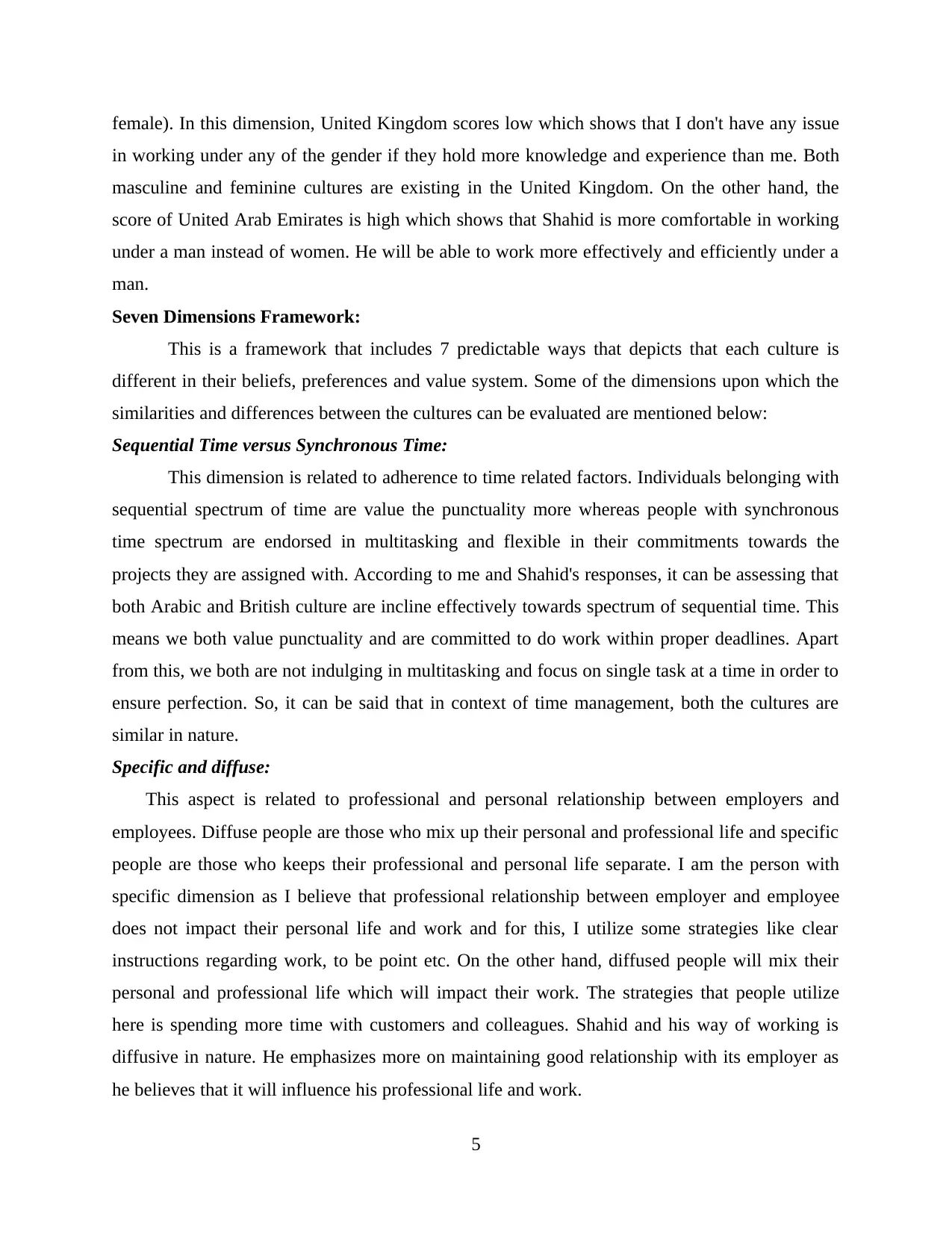
female). In this dimension, United Kingdom scores low which shows that I don't have any issue
in working under any of the gender if they hold more knowledge and experience than me. Both
masculine and feminine cultures are existing in the United Kingdom. On the other hand, the
score of United Arab Emirates is high which shows that Shahid is more comfortable in working
under a man instead of women. He will be able to work more effectively and efficiently under a
man.
Seven Dimensions Framework:
This is a framework that includes 7 predictable ways that depicts that each culture is
different in their beliefs, preferences and value system. Some of the dimensions upon which the
similarities and differences between the cultures can be evaluated are mentioned below:
Sequential Time versus Synchronous Time:
This dimension is related to adherence to time related factors. Individuals belonging with
sequential spectrum of time are value the punctuality more whereas people with synchronous
time spectrum are endorsed in multitasking and flexible in their commitments towards the
projects they are assigned with. According to me and Shahid's responses, it can be assessing that
both Arabic and British culture are incline effectively towards spectrum of sequential time. This
means we both value punctuality and are committed to do work within proper deadlines. Apart
from this, we both are not indulging in multitasking and focus on single task at a time in order to
ensure perfection. So, it can be said that in context of time management, both the cultures are
similar in nature.
Specific and diffuse:
This aspect is related to professional and personal relationship between employers and
employees. Diffuse people are those who mix up their personal and professional life and specific
people are those who keeps their professional and personal life separate. I am the person with
specific dimension as I believe that professional relationship between employer and employee
does not impact their personal life and work and for this, I utilize some strategies like clear
instructions regarding work, to be point etc. On the other hand, diffused people will mix their
personal and professional life which will impact their work. The strategies that people utilize
here is spending more time with customers and colleagues. Shahid and his way of working is
diffusive in nature. He emphasizes more on maintaining good relationship with its employer as
he believes that it will influence his professional life and work.
5
in working under any of the gender if they hold more knowledge and experience than me. Both
masculine and feminine cultures are existing in the United Kingdom. On the other hand, the
score of United Arab Emirates is high which shows that Shahid is more comfortable in working
under a man instead of women. He will be able to work more effectively and efficiently under a
man.
Seven Dimensions Framework:
This is a framework that includes 7 predictable ways that depicts that each culture is
different in their beliefs, preferences and value system. Some of the dimensions upon which the
similarities and differences between the cultures can be evaluated are mentioned below:
Sequential Time versus Synchronous Time:
This dimension is related to adherence to time related factors. Individuals belonging with
sequential spectrum of time are value the punctuality more whereas people with synchronous
time spectrum are endorsed in multitasking and flexible in their commitments towards the
projects they are assigned with. According to me and Shahid's responses, it can be assessing that
both Arabic and British culture are incline effectively towards spectrum of sequential time. This
means we both value punctuality and are committed to do work within proper deadlines. Apart
from this, we both are not indulging in multitasking and focus on single task at a time in order to
ensure perfection. So, it can be said that in context of time management, both the cultures are
similar in nature.
Specific and diffuse:
This aspect is related to professional and personal relationship between employers and
employees. Diffuse people are those who mix up their personal and professional life and specific
people are those who keeps their professional and personal life separate. I am the person with
specific dimension as I believe that professional relationship between employer and employee
does not impact their personal life and work and for this, I utilize some strategies like clear
instructions regarding work, to be point etc. On the other hand, diffused people will mix their
personal and professional life which will impact their work. The strategies that people utilize
here is spending more time with customers and colleagues. Shahid and his way of working is
diffusive in nature. He emphasizes more on maintaining good relationship with its employer as
he believes that it will influence his professional life and work.
5
Paraphrase This Document
Need a fresh take? Get an instant paraphrase of this document with our AI Paraphraser
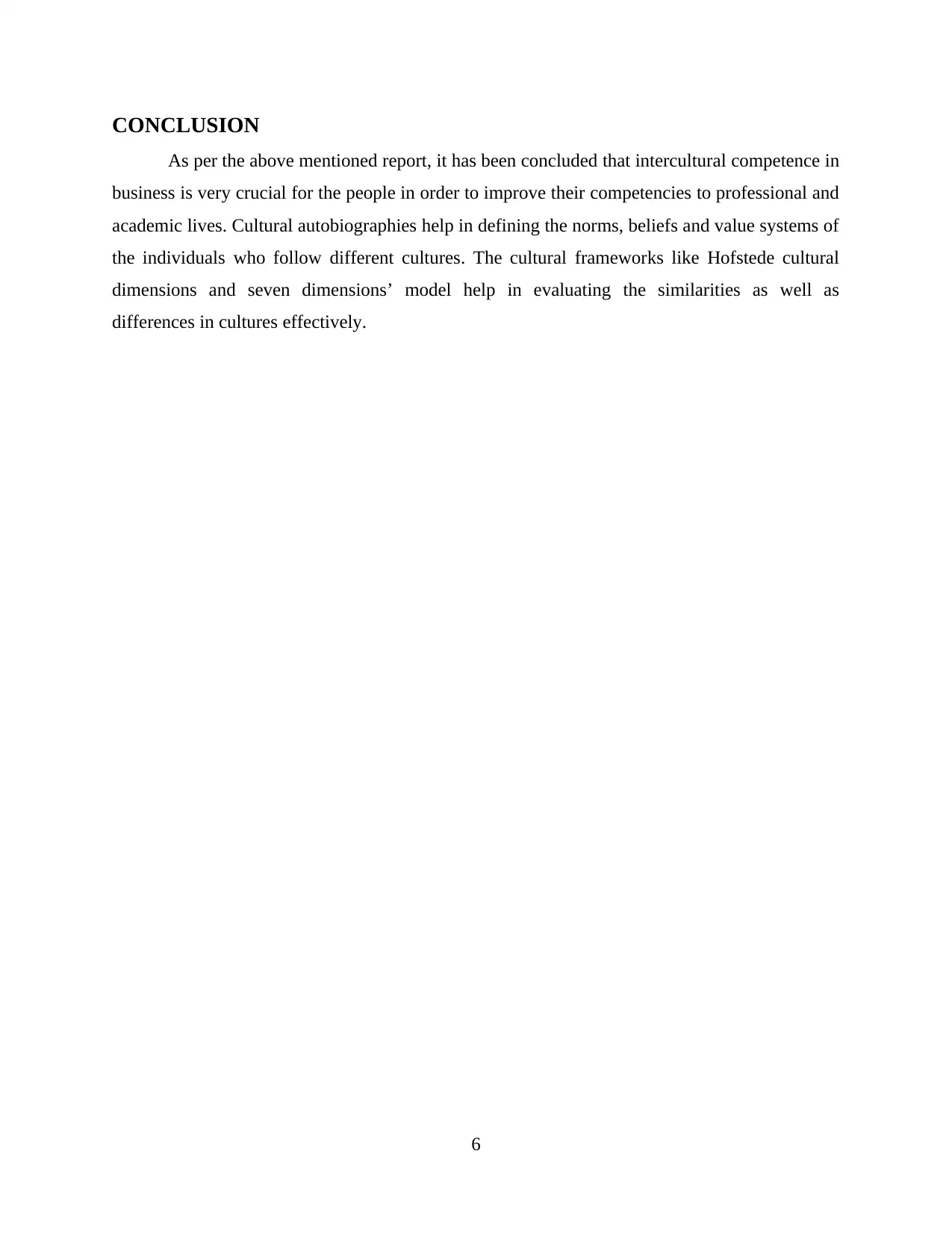
CONCLUSION
As per the above mentioned report, it has been concluded that intercultural competence in
business is very crucial for the people in order to improve their competencies to professional and
academic lives. Cultural autobiographies help in defining the norms, beliefs and value systems of
the individuals who follow different cultures. The cultural frameworks like Hofstede cultural
dimensions and seven dimensions’ model help in evaluating the similarities as well as
differences in cultures effectively.
6
As per the above mentioned report, it has been concluded that intercultural competence in
business is very crucial for the people in order to improve their competencies to professional and
academic lives. Cultural autobiographies help in defining the norms, beliefs and value systems of
the individuals who follow different cultures. The cultural frameworks like Hofstede cultural
dimensions and seven dimensions’ model help in evaluating the similarities as well as
differences in cultures effectively.
6
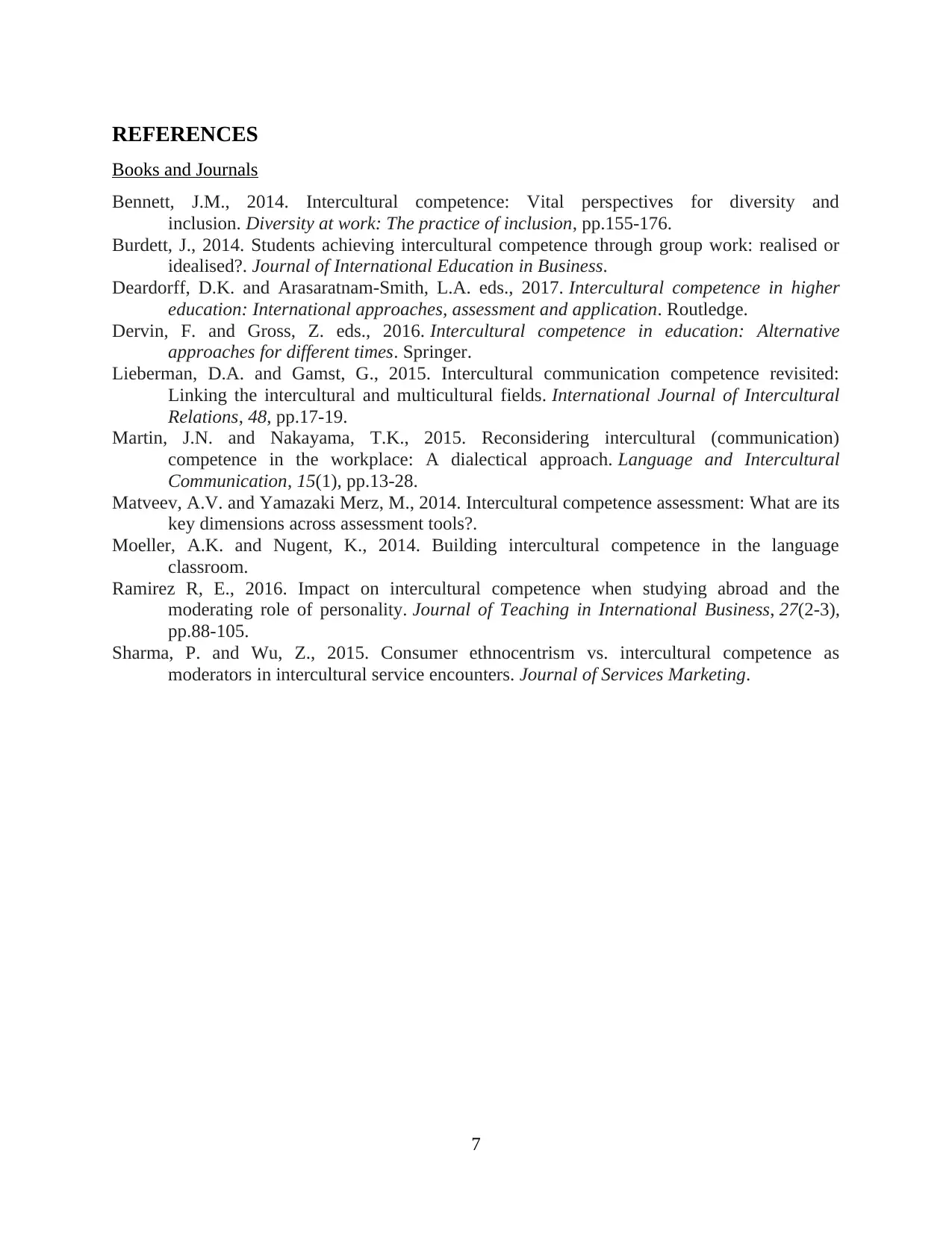
REFERENCES
Books and Journals
Bennett, J.M., 2014. Intercultural competence: Vital perspectives for diversity and
inclusion. Diversity at work: The practice of inclusion, pp.155-176.
Burdett, J., 2014. Students achieving intercultural competence through group work: realised or
idealised?. Journal of International Education in Business.
Deardorff, D.K. and Arasaratnam-Smith, L.A. eds., 2017. Intercultural competence in higher
education: International approaches, assessment and application. Routledge.
Dervin, F. and Gross, Z. eds., 2016. Intercultural competence in education: Alternative
approaches for different times. Springer.
Lieberman, D.A. and Gamst, G., 2015. Intercultural communication competence revisited:
Linking the intercultural and multicultural fields. International Journal of Intercultural
Relations, 48, pp.17-19.
Martin, J.N. and Nakayama, T.K., 2015. Reconsidering intercultural (communication)
competence in the workplace: A dialectical approach. Language and Intercultural
Communication, 15(1), pp.13-28.
Matveev, A.V. and Yamazaki Merz, M., 2014. Intercultural competence assessment: What are its
key dimensions across assessment tools?.
Moeller, A.K. and Nugent, K., 2014. Building intercultural competence in the language
classroom.
Ramirez R, E., 2016. Impact on intercultural competence when studying abroad and the
moderating role of personality. Journal of Teaching in International Business, 27(2-3),
pp.88-105.
Sharma, P. and Wu, Z., 2015. Consumer ethnocentrism vs. intercultural competence as
moderators in intercultural service encounters. Journal of Services Marketing.
7
Books and Journals
Bennett, J.M., 2014. Intercultural competence: Vital perspectives for diversity and
inclusion. Diversity at work: The practice of inclusion, pp.155-176.
Burdett, J., 2014. Students achieving intercultural competence through group work: realised or
idealised?. Journal of International Education in Business.
Deardorff, D.K. and Arasaratnam-Smith, L.A. eds., 2017. Intercultural competence in higher
education: International approaches, assessment and application. Routledge.
Dervin, F. and Gross, Z. eds., 2016. Intercultural competence in education: Alternative
approaches for different times. Springer.
Lieberman, D.A. and Gamst, G., 2015. Intercultural communication competence revisited:
Linking the intercultural and multicultural fields. International Journal of Intercultural
Relations, 48, pp.17-19.
Martin, J.N. and Nakayama, T.K., 2015. Reconsidering intercultural (communication)
competence in the workplace: A dialectical approach. Language and Intercultural
Communication, 15(1), pp.13-28.
Matveev, A.V. and Yamazaki Merz, M., 2014. Intercultural competence assessment: What are its
key dimensions across assessment tools?.
Moeller, A.K. and Nugent, K., 2014. Building intercultural competence in the language
classroom.
Ramirez R, E., 2016. Impact on intercultural competence when studying abroad and the
moderating role of personality. Journal of Teaching in International Business, 27(2-3),
pp.88-105.
Sharma, P. and Wu, Z., 2015. Consumer ethnocentrism vs. intercultural competence as
moderators in intercultural service encounters. Journal of Services Marketing.
7
1 out of 9
Related Documents
Your All-in-One AI-Powered Toolkit for Academic Success.
+13062052269
info@desklib.com
Available 24*7 on WhatsApp / Email
![[object Object]](/_next/static/media/star-bottom.7253800d.svg)
Unlock your academic potential
© 2024 | Zucol Services PVT LTD | All rights reserved.





